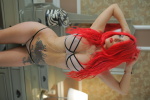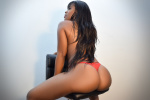I was listening to Conner Habib talking on a podcast last night.
As well as being a porn actor, he is an engaging conversationalist and also teaches writing workshops.
On the show, he was waxing lyrical about the novelist Joy Williams.
I've posted a link to the short essay he has written on her (below).
https://connerhabib.com/tag/joy-williams/
I've never read her but intend to do so now.
What I found interesting was what he had to say about plot, mood, and dialogue.
I am rehashing from memory now.
In dialogue, people do not respond to what is said to them; they reply with the thoughts their interlocutor's words have elicited in them.
He says dialogue should be oblique, somehow off the mark.
As to plots.
For the literary-inclined writer, plotting a storyline is what you do to allow your unique prose style to flourish. Events that move a plot along are incidental, mere posts to attach the threads of your prose to as you trace and enwind your way.
He is talking about "mood" in writing. He is talking about the kind of writing I like to think I practise.
Of course, everyone who comes to the craft has unique ambitions, differ in what they want to achieve.
Many readers probably enjoy the intricacies of a good plot, don't want prose as art.
Hence, the posting of this question here on lush.
What do you prefer as a reader/writer: Mood or plot?
And I know, I know —an intriguing plot full of atmosphere.
Everyone, readers and writers, feel free to add your own remarks below about style and plot.




















